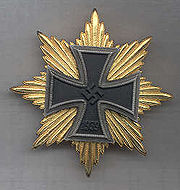Star of the Grand Cross to the Iron Cross
A Hypothetical German Medal of WWII
By Stephen Sherman, Nov. 2008. Updated July 15, 2011.
Under Nazi Germany, it was intended to present the Star of the Grand Cross of the Iron Cross as an award to the most successful German General of the Second World War, once Germany had achieved victory. As Germany was defeated in 1945, the decoration was never bestowed under Nazi authority and has not been awarded since. At least one medal was manufactured, but it was never presented. The only known example was found by Allied occupation forces at the end of the war, and was eventually added to the West Point military collection.
If it had been presented, it would have been a higher award than the Grand Cross of the Iron Cross, which itself was only awarded once in the Nazi era, to Reichsmarschall Herman Goering.
The Star of the Grand Cross of the Iron Cross had been awarded to the most outstanding of Generals who performed feats of leadership to the benefit of the German state. Only two awards were made, over a century apart, to Prince von Blücher in 1813 and to Field Marshal Paul von Hindenburg in 1918. Von Blücher's award was referred to as the Blücherstern while Hindenburg's was known as the Hindenburgstern.
Gebhard Leberecht von Blücher (December 16, 1742 in Rostock - September 12, 1819) in Krieblowitz (Silesia), Count, later elevated Prince of Wahlstatt, was a Prussian general who led his army against Napoleon Bonaparte at the Battle of Waterloo in 1815.
Paul Ludwig Hans Anton von Beneckendorff und von Hindenburg, known universally as Paul von Hindenburg (October 2, 1847 - August 2, 1934) was a German field marshal and statesman. After long career in the Prussian army, he retired in 1911, but was recalled at the outbreak of the First World War. Hindenburg first came to national attention, at the age of sixty-six, as the victor at Tannenberg in 1914. As Germany's Chief of the General Staff from 1916, he rose in the German public's esteem until Hindenburg came to eclipse the Kaiser himself. Hindenburg retired again in 1919, but returned to public life one more time in 1925 to be elected as the second President of Germany.
Hypothetically speaking, if Germany had prevailed in World War Two, or even survived as a government, the likeliest recipient would have been Hermann Goering. Getting into "double ifs," if Rommel had not been implicated in the July 20, 1944 plot to kill Hitler, he would have been another candidate.

